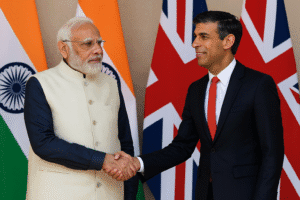Beyond the Handshake: What Modi’s UK Visit Reveals About India’s Global Balancing Act
Prime Minister Modi’s UK visit aims to finalize a landmark Free Trade Agreement (FTA), currently undergoing last-minute legal checks. Beyond the economic deal, the trip highlights India’s delicate geopolitical balancing act. Modi will confront pressing issues: urging the UK to curb Khalistani extremism on its soil and pressing for the return of economic fugitives.
Crucially, the talks occur against Western pressure over sanctions targeting Russia. India firmly asserts its right to prioritize energy security through Russian imports, rejecting perceived “double standards” in energy trade. Foreign Secretary Misri emphasized India’s unique challenges demand equal consideration alongside Europe’s security concerns.
While the UK suggests sanctions target only Russia’s war machine, not partners like India, underlying tensions persist. The visit underscores India’s resolve to pursue economic ambition while defending strategic autonomy on the global stage.

Beyond the Handshake: What Modi’s UK Visit Reveals About India’s Global Balancing Act
Prime Minister Narendra Modi’s whirlwind visit to London isn’t just about signing papers; it’s a high-stakes diplomatic tightrope walk. While a landmark Free Trade Agreement (FTA) between India and the UK appears tantalizingly close – undergoing final “legal scrubbing” according to Foreign Secretary Vikram Misri – the real story lies in the complex geopolitical currents swirling beneath the surface.
The FTA: More Than Just Trade
The potential signing of the long-negotiated FTA is undoubtedly the headline event. Neither side has issued an official confirmation, but the confidence expressed points towards a significant economic milestone. This deal aims to unlock vast potential, with leaders Modi and Keir Starmer also expected to discuss expanding cooperation into defence, technology, education, and people-to-people ties. For the UK, securing a major deal with the world’s fastest-growing large economy is a key post-Brexit objective. For India, it represents deeper access to a crucial market and a signal of its openness to strategic partnerships.
Navigating the Geopolitical Storm
However, overshadowing the trade optimism is the persistent thunder of the Russia-Ukraine war and Western sanctions:
- The Sanctions Tightrope: The West’s renewed push to pressure Russia through sanctions, including potential “secondary sanctions” impacting third countries trading with Moscow, directly threatens India’s significant energy imports from Russia. Foreign Secretary Misri’s pointed remarks weren’t coincidental. He explicitly called for shunning “double standards” on energy trade, highlighting a fundamental clash of priorities.
- India’s Unapologetic Stance: Misri firmly stated India’s energy security remains its “highest priority.” His argument was nuanced but clear: while acknowledging Europe’s “serious security issue,” he emphasized that the rest of the world faces its own “existential” challenges. India insists on a “clear-eyed perception” of the global energy market and demands “balance and perspective” in sanctions policy. The UK’s assurance that sanctions target only Putin’s “war machine” and not countries like India offers some relief, but the underlying tension remains unresolved.
- The Khalistani Factor & Fugitive Hunt: Beyond economics and global politics, Modi is expected to raise persistent concerns about Khalistani extremism operating from UK soil. Misri framed this not just as an Indian concern, but one that should worry the UK as a partner in stability. India will also press for the return of economic fugitives sheltering in the UK, with Misri dismissing the idea that Indian prison conditions are a legitimate barrier, citing the recent extradition of Tahawwur Rana.
The Significance of the Engagement
The visit’s structure itself speaks volumes. While designated an official visit focused on “policy outcomes” rather than a full state visit, Modi will still receive the distinct honour of separate meetings with both Prime Minister Starmer and King Charles III. This underscores the relationship’s importance to the UK. The packed schedule, including talks with business leaders from both nations, reinforces the multifaceted nature of the partnership.
The Bottom Line: A Test of Pragmatic Diplomacy
Modi’s London trip is a microcosm of India’s evolving global posture:
- Economic Ambition: Actively pursuing mutually beneficial deals like the FTA to fuel growth.
- Strategic Autonomy: Firmly defending its right to secure energy supplies and maintain relationships crucial to its development, even under Western pressure. The rejection of “double standards” is a powerful assertion of sovereign interest.
- Security Concerns: Insisting partners address threats like extremism emanating from their territory and cooperate on justice.
- Global Voice: Positioning itself as a voice for the broader Global South, demanding that its developmental and security needs are considered in Western geopolitical maneuvers.
The successful signing of the FTA would be a major achievement. Yet, the true measure of the visit’s success will lie in whether it fosters a deeper UK understanding of India’s complex position on Russia and sanctions, paving the way for a partnership that respects both nations’ core interests amidst a fractured global landscape. The handshake over the trade deal may capture the cameras, but the substance lies in the quieter conversations navigating an increasingly turbulent world.
You must be logged in to post a comment.